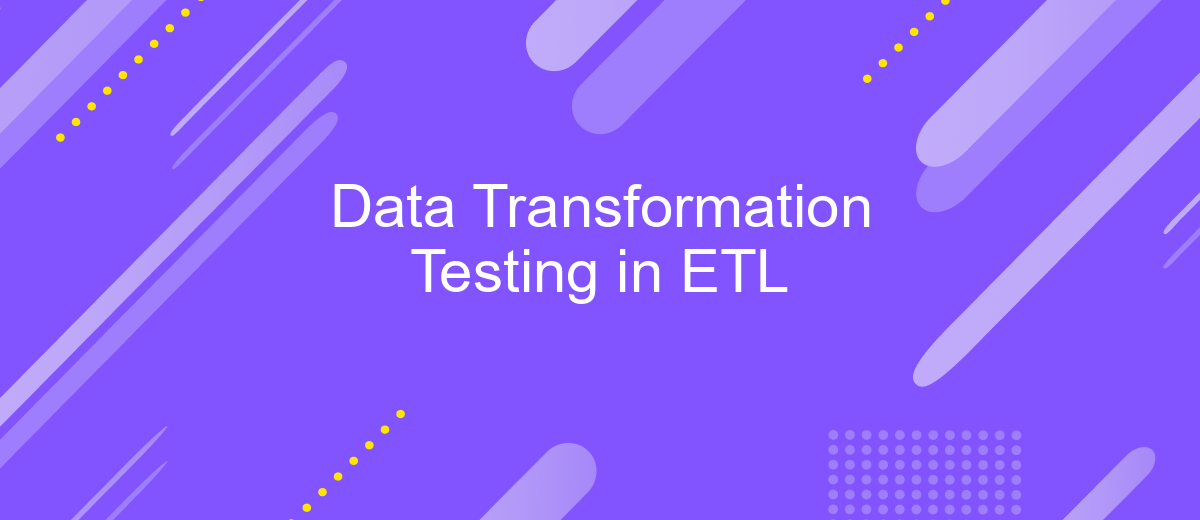Data Transformation Testing in ETL
Data transformation testing in ETL (Extract, Transform, Load) is a critical process that ensures the accuracy and integrity of data as it moves from source to destination. This testing phase verifies that data transformations are executed correctly, maintaining consistency and quality. In this article, we will explore the key aspects and best practices of data transformation testing, highlighting its importance in successful ETL workflows.
Introduction
Data transformation testing in ETL (Extract, Transform, Load) processes is a critical aspect of ensuring data integrity and accuracy. As organizations increasingly rely on data-driven decision-making, the need for robust ETL testing becomes paramount. This type of testing verifies that data transformations are performed correctly and that the final data set is accurate and reliable.
- Validation of data transformations
- Ensuring data accuracy
- Maintaining data integrity
- Automating ETL processes
Effective ETL testing involves a combination of manual and automated testing techniques. Tools like ApiX-Drive can facilitate this process by providing seamless integration and automation capabilities, ensuring that data flows smoothly from source to destination. By leveraging such tools, organizations can enhance their ETL processes, reduce errors, and improve overall data quality.
Data Transformation Concepts

Data transformation is a crucial step in the ETL (Extract, Transform, Load) process, involving the conversion of data from its raw form into a format suitable for analysis and reporting. This includes cleansing, filtering, aggregating, and enriching data to ensure its quality and consistency. Effective data transformation helps in identifying and rectifying inconsistencies, duplicates, and errors, making the data reliable for business intelligence and decision-making processes.
Various tools and services can facilitate data transformation, streamlining the integration process across different platforms. For instance, ApiX-Drive offers a robust solution for setting up integrations with multiple applications and services, automating the data flow and transformation tasks. By leveraging such services, organizations can enhance their ETL workflows, ensuring that transformed data is accurate, timely, and ready for downstream processing. This not only improves operational efficiency but also enables more informed decision-making.
Testing Data Transformations

Testing data transformations in ETL (Extract, Transform, Load) processes is crucial for ensuring data accuracy and reliability. It involves validating that the data transformation logic is correctly implemented and that the transformed data meets the required business rules and data quality standards.
Here are the steps to effectively test data transformations:
- Define transformation rules: Clearly document the expected transformations and the logic behind them.
- Create test cases: Develop test cases that cover all possible scenarios, including edge cases and invalid data inputs.
- Execute tests: Run the test cases using sample data to verify that the transformations are applied correctly.
- Compare results: Compare the output of the transformations with the expected results to identify any discrepancies.
- Automate testing: Use tools and services like ApiX-Drive to automate the testing process, ensuring consistency and efficiency.
By systematically testing data transformations, organizations can ensure that their ETL processes are robust and that the data they rely on is accurate and trustworthy. Utilizing services like ApiX-Drive can further streamline and enhance the testing process, making it more efficient and reliable.
Use Cases and Examples

Data transformation testing in ETL processes is essential for ensuring data accuracy and consistency. These tests validate that data transformations are executed correctly, maintaining the integrity of the data as it moves from source to target systems. Without rigorous testing, errors can propagate through the data pipeline, leading to inaccurate analytics and reporting.
Use cases for data transformation testing include data migration projects, integration of new data sources, and regular ETL process maintenance. For instance, when migrating data from legacy systems to modern platforms, it is crucial to verify that the data transformations align with the new system's requirements. Similarly, integrating new data sources into an existing data warehouse requires thorough testing to ensure data consistency.
- Data migration projects
- Integration of new data sources
- Regular ETL process maintenance
Tools like ApiX-Drive can facilitate these integration processes by automating data transfers and transformations between various systems. By leveraging such services, organizations can streamline their ETL workflows, reduce manual errors, and enhance the overall reliability of their data pipelines. Proper data transformation testing, supported by robust tools, is critical for maintaining data quality and achieving accurate business insights.


Best Practices and Considerations
Effective data transformation testing in ETL processes requires a well-structured approach. Start by defining clear and concise test cases that cover all possible scenarios, including edge cases and potential data anomalies. Ensure that your test data is representative of the actual data you'll be working with in production. Automating your tests can save time and increase accuracy, so consider using tools and frameworks that support automation. Regularly review and update your test cases to align with any changes in the ETL process or data sources.
It's also crucial to monitor and log all transformation activities to identify and troubleshoot issues quickly. Implementing integration services like ApiX-Drive can streamline this process by automating data flows between different systems, ensuring data consistency and reliability. Additionally, maintain thorough documentation of your ETL processes and test cases. This not only aids in troubleshooting but also ensures that knowledge is preserved and easily transferable among team members. By adhering to these best practices, you can enhance the efficiency and reliability of your ETL data transformations.
FAQ
What is Data Transformation Testing in ETL?
Why is Data Transformation Testing important?
What are some common challenges in Data Transformation Testing?
How can automation help in Data Transformation Testing?
What are the key steps in Data Transformation Testing?
Strive to take your business to the next level, achieve your goals faster and more efficiently? Apix-Drive is your reliable assistant for these tasks. An online service and application connector will help you automate key business processes and get rid of the routine. You and your employees will free up time for important core tasks. Try Apix-Drive features for free to see the effectiveness of the online connector for yourself.

